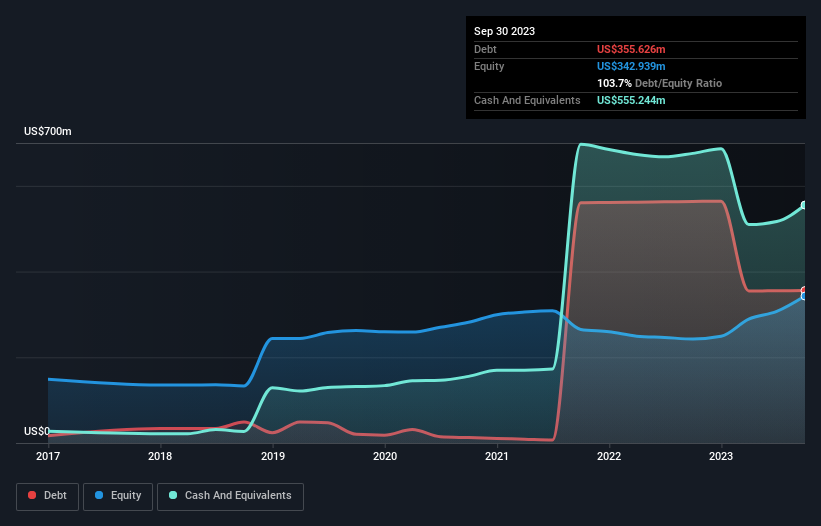
Warren Buffett famously said, 'Volatility is far from synonymous with risk.' So it might be obvious that you need to consider debt, when you think about how risky any given stock is, because too much debt can sink a company. We note that Upwork Inc. (NASDAQ:UPWK) does have debt on its balance sheet. But the real question is whether this debt is making the company risky.
When Is Debt A Problem?
Debt and other liabilities become risky for a business when it cannot easily fulfill those obligations, either with free cash flow or by raising capital at an attractive price. Ultimately, if the company can't fulfill its legal obligations to repay debt, shareholders could walk away with nothing. However, a more common (but still painful) scenario is that it has to raise new equity capital at a low price, thus permanently diluting shareholders. By replacing dilution, though, debt can be an extremely good tool for businesses that need capital to invest in growth at high rates of return. When we examine debt levels, we first consider both cash and debt levels, together.
View our latest analysis for Upwork
How Much Debt Does Upwork Carry?
As you can see below, Upwork had US$355.6m of debt at September 2023, down from US$563.5m a year prior. But it also has US$555.2m in cash to offset that, meaning it has US$199.6m net cash.

A Look At Upwork's Liabilities
The latest balance sheet data shows that Upwork had liabilities of US$253.1m due within a year, and liabilities of US$365.4m falling due after that. Offsetting these obligations, it had cash of US$555.2m as well as receivables valued at US$60.3m due within 12 months. So these liquid assets roughly match the total liabilities.
This state of affairs indicates that Upwork's balance sheet looks quite solid, as its total liabilities are just about equal to its liquid assets. So while it's hard to imagine that the US$1.99b company is struggling for cash, we still think it's worth monitoring its balance sheet. Despite its noteworthy liabilities, Upwork boasts net cash, so it's fair to say it does not have a heavy debt load! When analysing debt levels, the balance sheet is the obvious place to start. But ultimately the future profitability of the business will decide if Upwork can strengthen its balance sheet over time. So if you want to see what the professionals think, you might find this free report on analyst profit forecasts to be interesting.
In the last year Upwork wasn't profitable at an EBIT level, but managed to grow its revenue by 12%, to US$667m. That rate of growth is a bit slow for our taste, but it takes all types to make a world.
So How Risky Is Upwork?
Although Upwork had an earnings before interest and tax (EBIT) loss over the last twelve months, it made a statutory profit of US$13m. So when you consider it has net cash, along with the statutory profit, the stock probably isn't as risky as it might seem, at least in the short term. With revenue growth uninspiring, we'd really need to see some positive EBIT before mustering much enthusiasm for this business. There's no doubt that we learn most about debt from the balance sheet. However, not all investment risk resides within the balance sheet - far from it. For example - Upwork has 2 warning signs we think you should be aware of.
At the end of the day, it's often better to focus on companies that are free from net debt. You can access our special list of such companies (all with a track record of profit growth). It's free.
New: AI Stock Screener & Alerts
Our new AI Stock Screener scans the market every day to uncover opportunities.
• Dividend Powerhouses (3%+ Yield)
• Undervalued Small Caps with Insider Buying
• High growth Tech and AI Companies
Or build your own from over 50 metrics.
Have feedback on this article? Concerned about the content? Get in touch with us directly. Alternatively, email editorial-team (at) simplywallst.com.
This article by Simply Wall St is general in nature. We provide commentary based on historical data and analyst forecasts only using an unbiased methodology and our articles are not intended to be financial advice. It does not constitute a recommendation to buy or sell any stock, and does not take account of your objectives, or your financial situation. We aim to bring you long-term focused analysis driven by fundamental data. Note that our analysis may not factor in the latest price-sensitive company announcements or qualitative material. Simply Wall St has no position in any stocks mentioned.
About NasdaqGS:UPWK
Upwork
Operates a work marketplace that connects businesses with various independent professionals and agencies in the United States, India, the Philippines, and internationally.
Very undervalued with solid track record.
Similar Companies
Market Insights
Community Narratives



